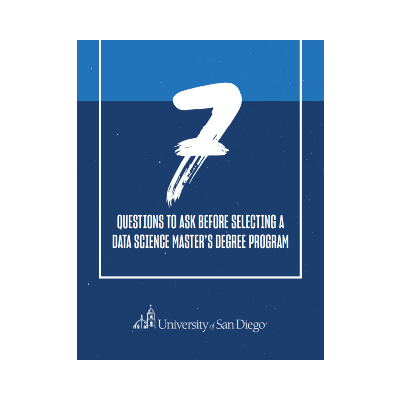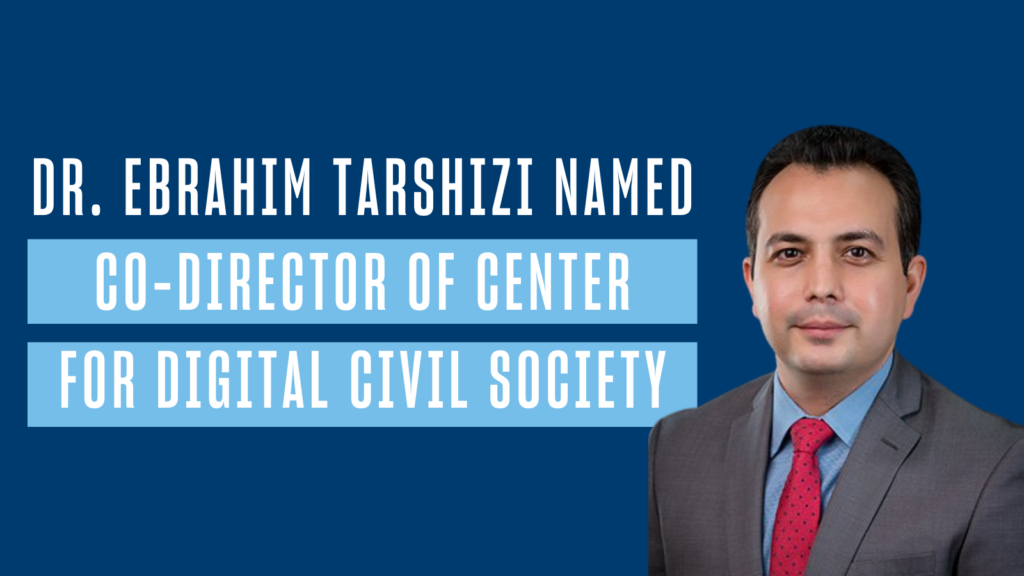A Closer Look at 5 Fields: Data Science, Data Analytics, Business Analytics, Artificial Intelligence, Machine Learning
For the purpose of discussion, let’s say you are fascinated with big data and the game-changing work being done across all industries in such data-related disciplines as data science, data analytics, business analytics, artificial intelligence, and machine learning.
Perhaps you have some work experience in a data-related role and are considering earning a master’s degree to level up your knowledge and skills, and position yourself to land one of the countless impactful, high-paying jobs in these in-demand, cutting-edge fields.
Or perhaps you are just starting your career, have some science, mathematics, or engineering in your educational background, and keep seeing articles about exciting breakthroughs and high demand for talent in these domains.
The job listings reveal that many of these jobs require a master’s degree (the higher-level ones, a Ph.D.). So how do you determine which data-related field, and which master’s degree course of study is right for you?
Well, despite nonstop advancements in these high-tech disciplines, there is no algorithm you can use to plug in your relevant personal and professional data, and compute an easy answer. Instead, read on for helpful insights as we take a closer look at each discipline, break down key similarities and differences, and more.
Data Analytics vs. Data Science vs. Business Analytics vs. Artificial Intelligence vs. Machine Learning
Definition of Terms
|
Definitions: Data Analytics | Data Science | Business Analytics | Artificial Intelligence | Machine Learning
|
| Data Analytics
Data Analytics is defined as qualitative and quantitative techniques and processes used to improve productivity and business performance. Data is extracted in order to identify and analyze specific data and patterns through various techniques required by organizations. Data analytics is widely used in business-to-consumer (B2C) applications. Organizations collect and analyze data associated with customers, business processes, market economics or practical experience. Data is categorized, stored and analyzed to identify purchasing trends and patterns.
|
| Data Science
Data Science is a broad field comprised of the collective processes, theories, concepts, tools and technologies that facilitate the review, analysis, and extraction of valuable knowledge and hidden information from raw data. Data science enables the use of theoretical, mathematical, computational, and other methods to review, evaluate, and model data. Its purpose is to help individuals and organizations make informed decisions from stored, consumed, and managed data.
|
| Business Analytics
Organizations employ methods and techniques called Business Analytics (BA) to measure performance. The field of business analytics is composed of statistical methods that can be applied to specific projects, processes, or products. Business analytics is extremely useful in identifying weaknesses in existing processes and highlighting meaningful data that can prep organizations for future growth and challenges. Business analytics is largely employed in decision support systems, continuous improvement programs, and elsewhere to help organizations remain competitive.
|
| Artificial Intelligence
Artificial Intelligence (AI), also referred to as machine intelligence, is a branch of computer science that aims to infuse software with the ability to analyze its environment using either predetermined rules and search algorithms or pattern recognizing machine learning models, and then enable it to make decisions based on those analyses. In this fashion, AI attempts to mimic biological intelligence to allow the software application or system to act with varying degrees of autonomy, thereby reducing the need for human intervention for a wide range of functions.
|
| Machine Learning
Machine Learning (ML) is an area of artificial intelligence that is focused on the technological development of human knowledge. Machine learning enables computers to handle new situations through analysis, self-training, observation, and experience.
|
Definitions adapted from Techopedia.com/dictionary
Data Science Degree Breakdown
A Master of Science in Data Science is a relatively new degree. Many current MS Data Science programs grew out of MS Data Analytics tracks, due to increased interest of students in the field of Data Science. These programs have been updated to better serve students and better market the schools’ programs. The goal is to enable students to master the technical skills and soft skills necessary for solving challenging, real-world analytics problems seen every day in a wide range of data-rich domains and industries.
Typical topics include, but are not limited to:
- Research Design
- Data Engineering
- Data Visualization
- Machine Learning
- Data Cleansing/Auditing
- Statistical Analysis & Programming
- Predictive Modeling
- Text Mining
Ideal for:
Candidates who currently work in any data-related and analytical positions or inquisitive professionals looking to enhance their understanding of structured and unstructured data in the scope of solving real-world problems.
[Webinar] WATCH: Data Science Careers Webinar [Key Info About an Extraordinary Opportunity] >>
Data Analytics Degree Breakdown
A data analytics master’s degree program provides comprehensive knowledge of data analytics and engages students in understanding the applications of the latest industry tools and approaches; this includes training in concepts and techniques for organizing, cleaning, analyzing, and representing/visualizing large amounts of data.
Typical topics include, but are not limited to:
- Fundamentals of Data Analytics
- Statistics for Data Analysis
- Data Mining and Analytics
- Programming in Python
- R for Data Analysts
- Advanced Data Visualization
- SAS Programming I: Fundamentals
- SQL for Data Analysis
Ideal for:
Mid-career IT professionals or students with a computer science background who seek to focus on analytics.
Business Analytics Degree Breakdown
A master’s in business analytics prepares students to work in technical roles involving such activities as extracting data to explain trends, predicting future performance, determining best approaches, and explaining solutions in the context of business to stakeholders. MS BA programs encourage students to use data-driven approaches to turn data into action, allowing stakeholders and leadership to make decisions that best benefit the organization.
Typical topics include, but are not limited to:
- Data Analysis & Business Concepts
- Statistics
- Data Management
- Prescriptive Analysis
- Financial Analytics
- Operations & Supply Chain Analytics
- Technical Communication
Ideal for:
Students who desire greater business experience and specialized analytics knowledge to add value from a technical standpoint. The ability to translate data trends into actionable objectives is key to any prospective Business Analyst.
Artificial Intelligence Degree Breakdown
A master’s degree in artificial intelligence is designed to equip graduates with the foundation, technical knowledge, and skills they will need to apply powerful, ethical, and socially responsible artificial intelligence techniques to real-world applications. Students are taught how to develop and deploy ethical and socially responsible intelligent systems and algorithms that autonomously solve challenging engineering and robotics problems.
Typical topics include, but are not limited to:
- Artificial Intelligence Frameworks
- Machine Learning
- Statistical Modeling
- Natural Language Processing (NLP)
- Neural Networks
- Deep Learning Foundations
- Human-Computer Interaction
- Computational Aspects of Robotics
Ideal for:
Candidates who plan to work within an organization that requires the application of AI-based tools and techniques for developing intelligent systems, machines, and automated data-driven decision making in a wide variety of industries.
Machine Learning Degree Breakdown
In a machine learning master’s degree program, courses typically explore the fundamental mathematics behind machine learning and artificial intelligence while teaching students to apply specific ML and AI tools to a variety of real-world problems.
Typical topics include, but are not limited to:
- Computational Learning Theory
- Advanced Machine Learning
- Foundations of Graphical Models
- Computer Vision
- Natural Language Processing
- Deep Learning
- Reinforcement Learning
Ideal for:
Professionals who are interested in understanding the application of machine learning tools and algorithms to generate insights. Machine Learning Engineers/Scientists understand the power of machine learning and deploy ML algorithms by learning from data.
Skills Needed for Key Data Science-Related Jobs
Job responsibilities in the various disciplines discussed here vary greatly depending on the company, its mission, and the employee’s role within the organization. Some of the fundamental skills required for each of the jobs detailed above include the following:
Data Science [Key Skills]
Some selected hard skills
- Statistical Analysis & Programming
- Data Visualization
- Data Cleaning/Manipulation
- Database Management
- Machine Learning
- Cloud computing
Some selected soft skills
- Problem solving
- Intellectual curiosity
- Domain knowledge
- Communication
- Teamwork
Data Analytics [Key Skills]
Hard skills
- SQL
- R and/or Python
- Spreadsheets (Microsoft Excel)
- Statistical programming languages
- Data visualization
- Domain knowledge
- Project management
Soft skills
- Critical thinking
- Communication
- Problem-solving
- Presentation skills
Business Analytics [Key Skills]
Some selected hard skills
- Data Management
- Statistical software/programming
- Methodology skills (ex. Six Sigma, Agile)
- Time series analysis
Some selected soft skills
- Business domain knowledge
- Decision making
- Communication
- Presentation
- Team player
Artificial Intelligence [Key Skills]
Some selected hard skills
- Mathematical and algorithms knowledge
- Intelligent machines
- Programming
- Natural language processing
- Machine learning
- Deep learning
Some selected soft skills
- Critical thinking
- Creativity
- Perseverance
- Learning agility
Machine Learning [Key Skills]
Some selected hard skills
- Convex optimization
- Programming
- Advanced signal processing
- Computer vision
- Natural language processing
Some selected soft skills
- Communication
- Teamwork
- Intellectual curiosity
- Systematic application of knowledge
Data Science Salary/Career Prospects
Opportunities for data scientists continue to expand across a broad spectrum of fields, with three-year hiring growth of 37%. TechRepublic called data scientist the “No. 1 most promising job in America” in 2019, citing a median base salary of $130,000 and a single-year increase in job openings of 56%. The U.S. Bureau of Labor Statistics reports median salaries of $118,370, with the top 10% earning more than $183,000. And a recent LinkedIn jobs search revealed the following firms among the thousands who are seeking data scientists: Macy’s, Apple, the New York Times, Tripadvisor, Lyft, IBM, and Microsoft.
Estimated salary range: $105,000–$200,000
Data Analytics Salary/Career Prospects
Demand for skilled, experienced data analytics professionals currently exceeds the supply, meaning companies are willing to pay a premium to fill open positions. Potential job opportunities include: health care data analyst, IT systems analyst, digital marketing analyst, and many more. A recent LinkedIn jobs search revealed the following firms among the thousands who are seeking data analysts: Nike, Google, Warner Bros., Amazon, Planet Fitness, Boston Scientific, and Harvard.
Estimated salary range: $62,000–$100,000+
Business Analytics Salary/Career Prospects
The Bureau of Labor Statistics reports ongoing job growth of 14% (described as “much faster than average”) and median salaries of $85,260, with the top 10% earning more than $154,310. Salaries vary widely based on the position and your experience. A recent LinkedIn jobs search revealed the following firms among the thousands who are seeking business analysts: Accenture, Amazon, Tesla, Cognizant, Gartner, and JPMorgan Chase.
Estimated salary range: $65,000–$160,000
Artificial Intelligence Salary/Career Prospects
High-paying career opportunities in artificial intelligence continue to expand across a broad spectrum of industries, with the market for AI engineers growing at about 30% year over year. The average salary for an artificial intelligence programmer is said to range from $100,000 to $150,000. Salaries are significantly higher for artificial intelligence engineers, averaging $171,715 with the top 25% earning above $200,000, according to one job search site. A recent LinkedIn jobs search revealed the following firms among the thousands who are seeking artificial intelligence engineers and related positions: IBM, Facebook, Lockheed Martin, Amazon Web Services, Peloton, Nike, and Netflix.
Estimated salary range: $100,000–$200,000+
Machine Learning Salary/Career Prospects
Machine learning engineer is ranked among the top jobs in many career listings, thanks to rapid growth and high salaries. Indeed.com rated it #1 on its list of best jobs for 2019. Specialty roles include natural language processing scientists focused on equipping machines with the ability to understand natural human languages. A recent LinkedIn jobs search revealed the following firms among the thousands who are seeking machine learning engineers and related positions: Apple, Spotify, Facebook, TikTok, Twitter, PayPal, and iRobot.
Estimated salary range: $108,00–$175,000
How to Choose the Right Program
Industry demand for each of the positions discussed above is strong, so it’s all a matter of following your instincts in determining which disciplines best align with your interests and aptitudes.
It is advisable to start by thoroughly reviewing the websites of any advanced degree programs you may be considering (Curriculum and Admission Requirements pages as well as the degree overview homepage).
Once you have narrowed down your options, consider reaching out to learn more about the programs you are considering by contacting an enrollment advisor. They will be able to answer all of your questions about:
- Online vs. on-campus options
- Tuition cost, financial aid, and possible scholarships
- Time commitment required
- Whether your background aligns with admissions requirements
- And more
Often, they can also put you in touch with a member of the faculty for further insight into what the program is really like and whether it aligns with your career goals.
If you’re ready to get started, consider checking out the online Master of Science in Applied Data Science offered by the University of San Diego. You’ll notice that the USD program has been developed by data science experts in collaboration with industry advisors to offer curriculum that is tailored to the needs of top employers.
When the time is right to talk to a USD advisor, you will also learn that the team at USD is invested in your success. The program’s mission is to position you for a fulfilling career in this important, fast-growing field.




